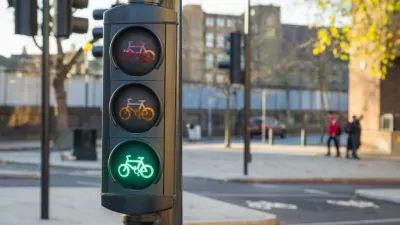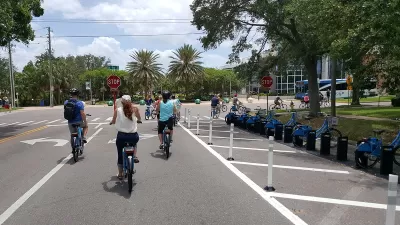Elisabeth Rosenthal reflects on the deterrent to cycling, and the use of bike-sharing systems, posed by mandatory bike helmet laws. Does the rare serious injury prevented by a helmet outweigh discouraging cycling's wider health benefits?
It turns out that mandatory helmet laws for bicyclists are largely peculiar to the United States, where the National Highway Traffic Safety Administration
recommends that "all cyclists wear helmets, no matter where they ride," and just a few other countries. In cities like Melbourne, Australia, where helmet use is mandatory, such laws may be contributing to the dismal use of its bike-sharing program, contends Rosenthal.
"One common denominator of successful bike programs around the world -
from Paris to Barcelona to Guangzhou - is that almost no one wears a
helmet, and there is no pressure to do so."
While helmets can prevent serious head injury in certain types of crashes, Rosenthal says that such falls are exceedingly rare in "mature urban cycling systems. On the other hand, many researchers say, if you force or pressure people
to wear helmets, you discourage them from riding bicycles."
"'Pushing helmets really kills cycling and bike-sharing in particular
because it promotes a sense of danger that just isn't justified - in
fact, cycling has many health benefits,' says Piet de Jong, a professor
in the department of applied finance and actuarial studies at Macquarie
University in Sydney. He studied the issue with mathematical modeling,
and concludes that the benefits may outweigh the risks by 20 to 1."
He adds: "Statistically, if we wear helmets for cycling, maybe we should
wear helmets when we climb ladders or get into a bath, because there
are lots more injuries during those activities."
FULL STORY: To Encourage Biking, Cities Lose the Helmets

Maui's Vacation Rental Debate Turns Ugly
Verbal attacks, misinformation campaigns and fistfights plague a high-stakes debate to convert thousands of vacation rentals into long-term housing.

Planetizen Federal Action Tracker
A weekly monitor of how Trump’s orders and actions are impacting planners and planning in America.

San Francisco Suspends Traffic Calming Amidst Record Deaths
Citing “a challenging fiscal landscape,” the city will cease the program on the heels of 42 traffic deaths, including 24 pedestrians.

Defunct Pittsburgh Power Plant to Become Residential Tower
A decommissioned steam heat plant will be redeveloped into almost 100 affordable housing units.

Trump Prompts Restructuring of Transportation Research Board in “Unprecedented Overreach”
The TRB has eliminated more than half of its committees including those focused on climate, equity, and cities.

Amtrak Rolls Out New Orleans to Alabama “Mardi Gras” Train
The new service will operate morning and evening departures between Mobile and New Orleans.
Urban Design for Planners 1: Software Tools
This six-course series explores essential urban design concepts using open source software and equips planners with the tools they need to participate fully in the urban design process.
Planning for Universal Design
Learn the tools for implementing Universal Design in planning regulations.
Heyer Gruel & Associates PA
JM Goldson LLC
Custer County Colorado
City of Camden Redevelopment Agency
City of Astoria
Transportation Research & Education Center (TREC) at Portland State University
Jefferson Parish Government
Camden Redevelopment Agency
City of Claremont




























